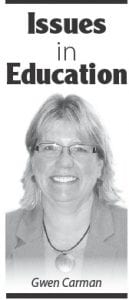The traditional school calendar with several weeks of “summer vacation” has been in existence since the early days of public education. While there is a widely held belief that our school calendar was originally based on the “farmer’s calendar,” i.e., “farmers needed their children home in the summer to help on the farm,” that is actually more of a myth. In the 1800s, most rural schools had school breaks in the spring and fall during the planting and harvest seasons, and urban schools generally operated year-round. School reformers worked to get urban and rural schools on similar calendars, and the summer vacation term evolved. Ironically, one of the reasons the summer break was chosen was because urban/ wealthier families already often took extended summer vacations.
Unfortunately, it is not unusual for non-academic interests to play a key role in making decisions about education. And it is mind-boggling that we keep following this calendar, even though it is widely known that the long summer break from school results in a significant loss of math and reading skills for many students. This happens because many students do not consistently practice math skills or read over the summer.
According to a report from the National Summer Learning Association: “A conservative estimate of lost instructional time is approximately two months or roughly 22 percent of the school year…. It’s common for teachers to spend at least a month re-teaching material that students have forgotten over the summer. That month of re-teaching eliminates a month that could have been spent on teaching new information and skills.” And for some students, it will take even longer than a month to get their reading and math skills back to where they were in May.
Research has shown that the cumulative effect of summer learning loss is a primary cause of widening achievement gaps between students of lower and higher socioeconomic levels. While student achievement for both middle- and lower income students improves at similar rates during the school year, low-income students often experience cumulative summer learning losses throughout their elementary school years. (Source: Reading Is Fundamental)
What can families do to keep children reading during the summer? As children’s first and most important teachers, helping children enjoy and practice reading is one of the most important things parents and caregivers can do. Here are some ideas to encourage summertime reading.
. Combine activities with books. Summer leaves lots of time for kids to enjoy fun activities, such as going to the lake, camping, playing baseball or going to visit family outside the county. Parents can provide opportunities for their child to read a book about the activity, or town/state beforehand. While traveling, talk about the book and what s/he is learning. Joke books are also a great way to pass time during car rides!
Visit the Grand Marais Library or other libraries when you are traveling. In addition to a wide selection of books to borrow with a free library card (the Arrowhead Library System cards work at many libraries in our region), most libraries are air-conditioned and can provide a quiet break and time to read together.
. Lead by example. Read the newspaper at breakfast, pick up a magazine at the doctor’s office, and stuff a paperback in your beach bag. If kids see the adults around them reading often, they will understand that literature can be a fun and important part of their summer days.
. Have plenty of reading material around. Summer is a time when children can read what, when, and how they please. Don’t focus on daily minute requirements or the number of pages they should read. Instead, make sure they have books for fun and help find ways for them to choose to read on their own. Be sure to have newspapers, magazines, and informational material on hand that might spark the interest of your young reader.
. Use books to break the boredom. Without the regular school regimen, adults and kids need more activities to fill the hours. Books that teach kids how to make or do something are a great way to get kids reading and keep them occupied. Don’t rely on video games, TV, phones or other electronics to occupy their time. Not reading and too much electronics negatively impact brain development and attention spans.
. Read aloud with kids. Readalouds with children, no matter what their age are fun! Take turns reading pages or just let them listen to you read as they listen and/or follow the text. Don’t forget to improvise different voices to make the story that much more interesting! They will love it!
Cook County students are half way through their 14 weeks of “summer vacation.” I’m hoping they are all finding time to read and practice those math facts!
Each month a representative of our local schools will offer thoughts in Issues in Education. This month’s s contributor is Gwen Carman, PK-12 principal, Sawtooth Elementary School.



Loading Comments